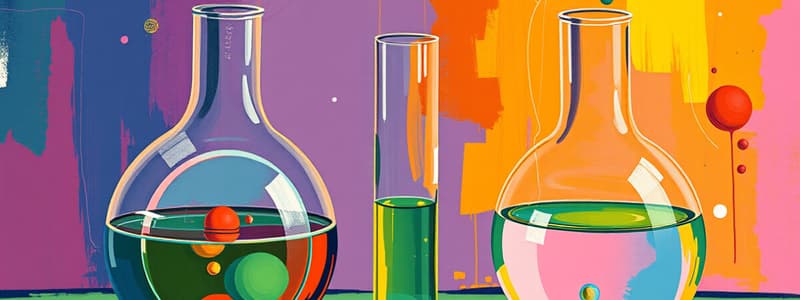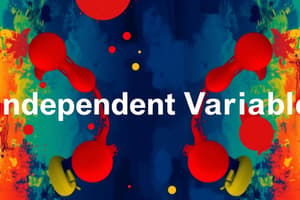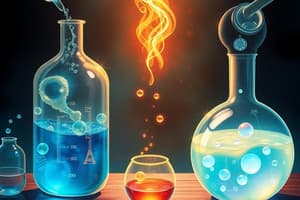Podcast
Questions and Answers
What must happen to support a hypothesis regarding the boiling point of water?
What must happen to support a hypothesis regarding the boiling point of water?
- The water must remain still at temperatures above 100 °C.
- The water must evaporate without boiling.
- The temperature must be below 100 °C.
- The water must boil at or above 100 °C. (correct)
Which statement correctly reflects the purpose of the scientific controls within an experiment?
Which statement correctly reflects the purpose of the scientific controls within an experiment?
- To ensure that all data collected is qualitative.
- To maximize the number of variables in the experiment.
- To minimize unintended influences on the experiment. (correct)
- To manipulate both the independent and dependent variables.
What does the dependent variable represent in a controlled experiment?
What does the dependent variable represent in a controlled experiment?
- The condition that is manipulated by the experimenter.
- The control conditions that remain constant.
- The set of samples expected to show change.
- The variable that is measured as a response. (correct)
What kind of statement should a testable hypothesis resemble?
What kind of statement should a testable hypothesis resemble?
Why is replication important in scientific experiments?
Why is replication important in scientific experiments?
What is the primary role of the independent variable in an experiment?
What is the primary role of the independent variable in an experiment?
What is a key characteristic of a hypothesis in the scientific method?
What is a key characteristic of a hypothesis in the scientific method?
In the example where chemical reactions are tested at different temperatures, which of the following is the dependent variable?
In the example where chemical reactions are tested at different temperatures, which of the following is the dependent variable?
Which statement best describes the relationship between the independent and dependent variables in experiments?
Which statement best describes the relationship between the independent and dependent variables in experiments?
Why is it inaccurate to claim that a hypothesis can be 'proven' through experimentation?
Why is it inaccurate to claim that a hypothesis can be 'proven' through experimentation?
Flashcards are hidden until you start studying
Study Notes
Scientific Method Overview
- A systematic approach for researchers to explore questions based on observations.
- Involves posing a question, forming a hypothesis, conducting experiments, and interpreting results.
- Aims to determine if experimental results support or contradict the hypothesis.
Key Terminology
- Independent Variable: The manipulated variable in an experiment; considered the cause of changes.
- Example: Temperature adjustments from 0-100 °C in a chemical reaction experiment.
- Dependent Variable: The variable that responds to changes made to the independent variable; considered the effect.
- Example: The products resulting from a chemical reaction affected by temperature changes.
- Hypothesis: A testable statement derived from existing knowledge; must be falsifiable.
- Example: Expecting deionized water to boil when reaching temperatures above 100 °C.
Steps of the Scientific Method
- Problem Identification:
- Observe and integrate information regarding a study object.
- Develop questions based on observations, typically addressed with who, what, why, how, when, and where.
- Hypothesis Formation:
- Construct educated guesses that can be tested through experimentation.
- Hypotheses generate predictions that follow the format: "If my hypothesis is correct, then I should observe…"
- Experiment Design:
- Create and execute an experiment to test hypotheses.
- Control variables to isolate the effects of the independent variable.
- Experimental group modified while a control group remains unchanged to measure effects accurately.
- Experimentation and Replication:
- Conduct the experiment multiple times to ensure reliable and representative results.
- More replicates increase confidence in the experiment's results.
- Data Collection and Analysis:
- Collect data systematically and analyze using statistical tools.
- Utilize graphs and tables to present data; typical statistical measure is the mean.
- Various graph types (line, bar, pie, scatter plot) help visualize data trends efficiently.
Studying That Suits You
Use AI to generate personalized quizzes and flashcards to suit your learning preferences.




